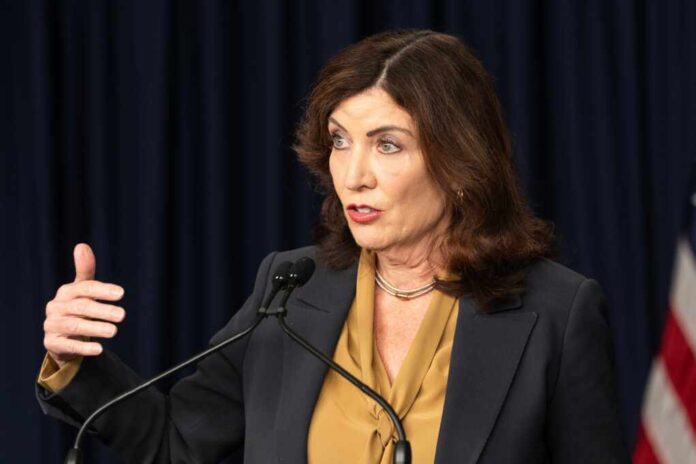
The Democrat-controlled state of New York has been discreetly distributing cash welfare payments to thousands of migrants. The payments made under the instructions of Gov. Kathy Hochul (D) have fundamentally altered the dynamics of non-citizen eligibility for welfare.
The New York Office of Temporary and Disability Assistance (OTDA) has revised the Safety Net Assistance (SNA) program’s guidelines, now allowing migrants who have initiated asylum application processes to receive taxpayer funds.
This quiet rule change, enacted in May 2023, broadens the definition of eligibility to include “non-citizens who are considered permanently residing under color of law (PRUCOL).” Despite the term PRUCOL not denoting an immigration status, it has been employed by the OTDA to extend benefits under the SNA, a welfare program traditionally aimed at New Yorkers in dire need, including families and individuals outside the conventional welfare system.
NY Gov. changes the rules so illegals get welfare.
New York Migrants Receiving Cash Welfare Payments After Quiet Rule Change
The Democrat-controlled state of New York has been quietly handing out cash payments to thousands of migrants under a rule change qualifying non-citizens… pic.twitter.com/ziGym8lzP7— floridanow1 (@floridanow1) February 19, 2024
Critics argue this adjustment imposes an additional financial burden on New York taxpayers and magnetizes further migration to the state, exacerbating an already critical situation. With over 173,000 migrants arriving in New York City since early 2022, the potential strain on state resources is monumental. If merely 10% of these individuals become eligible for SNA benefits, the number of new beneficiaries could exceed 17,000 in New York City alone.
Rep. Nicole Malliotakis (R-NY) and New York City Councilman Robert Holden (D) have vocally criticized the expansion, denouncing it as detrimental to local taxpayers and an unwarranted handout at the expense of longtime residents. Their sentiments reflect a growing dissatisfaction among New Yorkers who feel that their fiscal responsibility and community welfare are being sidelined in favor of non-citizens.
The Hochul administration, however, defends its actions as a necessary response to a migrant crisis magnified by what they perceive as federal inaction. An OTDA spokesman highlighted that the SNA migrant payments constitute only a “small portion” of the $4.3 billion set aside by Hochul for handling the migrant influx, implying a measure of fiscal prudence amid the crisis.
Yet, this rationale does little to quell the concerns of those like Michael Kracker, chair of the Erie County Republican Committee, who deems the payments “deeply offensive” to struggling New Yorkers, including homeless veterans seeking state aid. Critics like Kracker argue that the state’s priorities are misplaced, favoring newcomers over its citizens.
This development comes amid a broader debate over immigration policy and welfare eligibility in the United States. While proponents argue that providing aid to migrants is a humanitarian obligation, opponents see it as an encouragement of illegal immigration and a misallocation of limited resources, potentially leading to a “fiscal bottomless pit,” as warned by Lora Ries, director of the Border Security and Immigration Center at The Heritage Foundation.
































